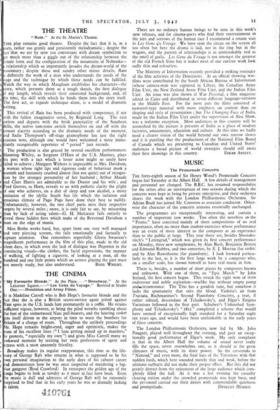THE THEATRE
"Rain." At the St. Martin's Theatre.
Is play remains good theatre. Despite the fact that it is, as a ory, rather too grimly and persistently melodramatic ; despite the act that we are by now too conversant with dream symbolism to et much more than a giggle out of the relationship between the emale form and the configuration of the mountains of Nebraska-- relationship which so importantly invades the dream-world of the issionary ; despite these and sundry other minor details, Rain s definitely the work of a man who understands the needs of the age and the technique by which those needs can be fulfilled. atch the way in which Maugham establishes his characters—the ntry, which presents them as a rough sketch, the first dialogue f any length, which reveals their emotional background, and, all he time, the skill with which he binds them into the story itself. e first act, as regards technique alone, is a model of dramatic riting.
This revival of Rain has been produced with competence, if not ith the fullest imaginative sense, by Reginald Long. The rain rives and departs with the brisk punctuality of the Southern elle, the native tom-toms switch themselves on and off with the tmost alacrity according to the dramatic needs of the moment, nd Sadie Thompson's off-stage gramophone has just the right aucous note, although one would have welcomed a more imme- lately recognisable repertoire of " period " jazz records.
The production is also graced by several excellent performances.
• g Whiley, as Sergeant O'Hara of the U.S. Marines, plays is part with a tact which a lesser actor might so easily have ailed to achieve ; Margaret Withers is impeccable as Mrs. Davidson, woman whose tight lips and rigorous code of behaviour mask a armth and humanity crushed almost (but not quite) out of recogni- on by the stronger personality of her husband ; Arthur Maude d Clare Harris are admirable as the Doctor and his wife ; and red Groves, as Horn, reveals to us with pathetic clarity the plight one who achieves, on a diet of sleep and raw alcohol, a misty Station of the idyllic South Sea life which the isolation and trocious climate of Pago Pago have done their best to nullify. nfortimately, however, the two chief parts miss their respective ts by several miles ; more, it is only fair to say, by miscasting an by lack of acting talent—G. H. Mulcaster fails entirely to eveal those hidden fires which make of the Reverend Davidson a an on the edge of mania.
Miss Rotha works hard, but, apart from one very well managed nd very piercing scream, she fails emotionally and factually to apture attention. One remembers regretfully Gloria Swanson's agnificent performance in the film of this play, made in the old dent days, in which even the lack of dialogue was forgotten in the onvincing visuals—the clothes, the facial expressions, the manner f walking, of lighting a cigarette, of looking at a man, all the undred and one little points which an actress playing the part must
ot merely study, but also understand. BASIL WRIGHT.


























 Previous page
Previous page